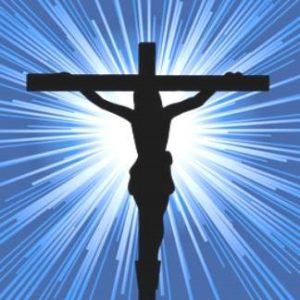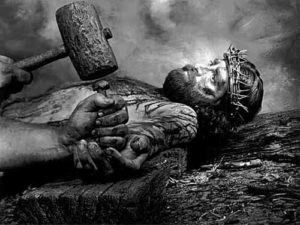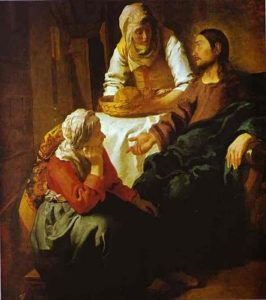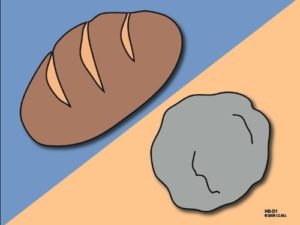JESUS BECAME A CURSE TO REDEEM US FROM THE CURSE; THE PRIORITY OF THE DISCIPLES
Congratulations! If you have been reading the daily portions of the “One Year Bible” with us since January 1rst, you are now more than a quarter of the way through the entire Bible, the Book of Books!
Some people read the Bible randomly searching for promises, principles, themes, and stories. The Bible indeed contains theses. But the Bible is not first and foremost a book of promises to claim and principles to live by. It is the story of God’s plan of redemption that is centered in Christ. It is a declaration of what God has done for us in His Son. The immeasurable gift of God’s saving work, including His life-transforming grace, is offered to all and can be experienced when God opens the eyes of our heart’s understanding to see and believe.
Jesus said that all the Scriptures testify of Him (John 5:39-40). The Law of Moses, the Prophets, and the Psalms speak of the work that He came to fulfill (Luke 24:44). The Bible makes us wise to God’s plan of salvation (2 Timothy 3:15). You are blessed if you take that wisdom to heart.
The apostles preached the gospel of Jesus Christ from the Old Testament Scriptures. The Old Testament was the only Bible they had at the time. The Holy Spirit helped them see the many prophetic pictures of Jesus in the Old Testament.
Dane Ortland writes that the Bible’s theology is the “historically-rooted good news about the grace of God through the Son of God for the people of God to the glory of God.”
“A biblical theology lens trains us to place any given passage in the sweep of the single story. This way of reading the Bible gladly acknowledges the various genres in Scripture—narrative, poetry, prophecy, letters. Yet while the Bible is not uniform, it is unified.”
As we approach the end of the Book of Deuteronomy we need to recall Jesus’ words:
John 5:46 “For if you believed Moses, you would believe Me; for he wrote of Me.
THE NECESSITY OF CHRIST BECOMING A CURSE FOR US
Today we read about the blessings of obedience and the curses upon the disobedient.
The ‘blessing and curse motif’ of Deuteronomy powerfully informs our understanding of the redemptive work of Jesus Christ on the cross.
In Deuteronomy 27, Moses and the elders of Israel tell the people to build large monuments of stone coated with lime upon which they are to write all the words of the Law. The stones shall be set up at Mount Ebal. They are also to build an altar there. No tool shall be used to make the altar as it represents the work of God and not the work of men. (27:5-6).
THE LAW AND THE ALTAR
The people of God have both a law and an altar in the Promised Land. The law spells out the righteousness that God requires. The altar represents the place where the righteousness of God is offered. The demands of God’s holy law can only be met in the righteous living of Christ, who shed His blood as a perfect offering on the altar of the cross on our behalf. The law brings to light our disobedience which can only bring a curse. The altar brings to light Christ’s obedience offered for us, which is the only means of bringing a blessing.
Moses charges the people to have the blessings of the law proclaimed with a loud voice by the Levites from the top of Mount Gerazim where the tribes of Simeon, Levi, Judah, Issachar, Joseph, and Benjamin are assembled.
THE CURSES AND THE BLESSINGS
The curses of the law will be proclaimed by Levites from the top of Mount Ebal where Reuben, Gad, Asher, Zebulun, Dan, and Naphtali are assembled.
The curse of God came upon the earth and the serpent in Genesis 3 as a result of the disobedience of the first man Adam (male and female joined as one). The promise given to Abraham was a blessing made available by faith, the reversal of that curse through His Seed (Jesus Christ, Galatians 3:16). That Seed would be the source of blessing to all the nations of the earth.
God’s promise is to bring the blessing of ‘being counted as righteous’ to all who believe the gospel. The Promised Seed of the Woman (Genesis 3:15) who is also the Promised Seed of Abraham (Galatians 3:16) is Jesus Christ. He lived without sin, fulfilling the descriptive requirements for inheriting the blessing of eternal life (2 Cor 5:21; John 8:46). The promise of the Holy Spirit is won on our behalf through the obedience of Christ. He offers His perfect life on the altar.
The “curse motif” is used by the Apostle Paul to demonstrate how Jesus’ death on the cross provides a full atonement for our sins. This is the only way that a blessing can be imputed to us.
The curses are pronounced in Deuteronomy 27:15-26. The summary curse is that of transgressing the law.
Deut. 27:26 “Cursed is the man who does not uphold the words of this law by carrying them out.”
Jesus had to become an incarnation of the Divine Curse in order to bring us the Divine Blessing. The sins of Adam’s race are imputed to Jesus. He takes the wrath of Divine Justice against sin upon Himself.
2 Cor. 5:21 God made him who had no sin to be sin for us, so that in him we might become the righteousness of God.
Galatians 3:10-11 All who rely on observing the law are under a curse, for it is written: “Cursed is everyone who does not continue to do everything written in the Book of the Law.” [11] Clearly no one is justified before God by the law, because, “The righteous will live by faith.”
Galatians 3:13-14 Christ redeemed us from the curse of the law by becoming a curse for us, for it is written: “Cursed is everyone who is hung on a tree.” [14] He redeemed us in order that the blessing given to Abraham might come to the Gentiles through Christ Jesus, so that by faith we might receive the promise of the Spirit.
The Apostle Paul is referring to Deuteronomy 21:22-23:
Deut. 21:22-23 “If a man has committed a sin worthy of death and he is put to death, and you hang him on a tree, [23] his corpse shall not hang all night on the tree, but you shall surely bury him on the same day (for he who is hanged is accursed of God), so that you do not defile your land which the Lord your God gives you as an inheritance.”
A person is not cursed because they are hanging on a tree. The person was in that position of publicly hanging on a tree because they were accursed of God. People were to be reminded that the curse is the judgment of the Law upon the sin of disobedience. Under the law of God, the just punishment for our sin is death (Romans 6:23). The public exposure of the Law’s judgment upon sin served to expiate the guilt of sin from the land, warning society of the wages of sin. This display of judgment upon sin is similar to what we saw in Numbers 21 when Moses lifted up the brazen serpent upon the pole, prefiguring Christ being raised up on the cross as our atoning sacrifice.
John 3:14-16 “As Moses lifted up the serpent in the wilderness, even so must the Son of Man be lifted up; [15] so that whoever believes will in Him have eternal life.
[16] “For God so loved the world, that He gave His only begotten Son, that whoever believes in Him shall not perish, but have eternal life.
It is a picture of the demands of the Law being satisfied. The sinner is accursed of God. Full justice is enacted upon the guilty. The removal of the body of the sinner was a picture of sin being put away and the curse being removed in order that the blessing upon obedience (provided by Another, the Seed of Abraham) might be received as an inheritance.
THE OFFERING OF OUR FIRST FRUITS 
Deuteronomy Chapter 26 introduces the Law of the First-Fruits Offering that is to be implemented when the children of Israel come into the land. They are to bring before the Lord the first of the produce that the Lord blesses them with and present it as an offering. Not the dregs, not the leftovers. They are to bring the first and the best. As they bring the offering they are to acknowledge their history. Their fathers were once not a people. They went down to Egypt and God miraculously answered their prayers. In delivering them from Egypt He made them a great and privileged nation. They were to confess that it was the Lord who brought them into the land and blessed them with fruit. That blessing would be made evident to all-to the praise of the glory of God’s grace.
The giving of the believer should reflect that we acknowledge God as our resource. The Lord gives us all that He is and all that He has. He gives us the added joy of being able to give back to Him and to give to others.
May the Lord be glorified in our fruitfulness and our willingness to honor Him as the Giver of every good and perfect gift (James 1:17)! May our fruitfulness be evident to all, to the praise of the glory of His grace!
John 15:8 “My Father is glorified by this, that you bear much fruit, and so prove to be My disciples.
NEW TESTAMENT READING- Luke 10:38-11:13; MARY and MARTHA
THE DISCIPLE’S POSITION- THE POSTURE OF LEARNING
Mary sat “at the feet of Jesus”. This expression is used to depict “the posture of learning”.
Jesus welcomed female disciples. He encouraged them to hear and heed His words.
In giving his testimony, the apostle Paul describes his relationship to his teacher, the famed Rabbi, Gamaliel.
Acts 22:3 “I am indeed a Jew, born in Tarsus of Cilicia, but brought up in this city at the feet of Gamaliel, taught according to the strictness of our fathers’ law, and was zealous toward God as you all are today.
The phrase is translated as being “educated under”. Jesus brings education wherever He goes.
Mary took advantage of what Jesus was offering to her. Martha, equally fond of Jesus, was missing the purpose of the visit, the opportunity to receive instruction from Jesus. She was serving Jesus but missing out on moments when she could have truly honored His presence by sitting at His feet.
Much good is to be said of Martha. She welcomed Jesus into her home. She provided him with hospitality. But she got distracted by the details of the occasion and lost sight of the big picture. The project became more important than the overarching purpose. She pitied herself and resented Mary for not helping her with the preparations.
Preparations for what?
Luke 10:41-42 (NASB) 41 But the Lord answered and said to her, “Martha, Martha, you are worried and bothered about so many things; 42 but only one thing is necessary, for Mary has chosen the good part, which shall not be taken away from her.”
Only one thing is necessary. There is only one priority we are to have in life. It is to choose that which shall not be taken away from us.
That which endures forever are the words of Christ (Matthew 24:35). We are not to let them pass us by.
Let’s check our priorities. We may be on our feet in the kitchen, but let us abide in a position of being humbly instructed by His Word. Let us give Him our focused attention.
THE DISCIPLE’S PRAYER
Jesus gave us instructions for prayer. We are to submit ourselves to the Father as His children. We do not say “My Father”. We are not placed in God’s family in our own right. J.I. Packer sums up the gospel in three words: “Adoption by propitiation”. We can only be placed as rightful family members through the work of God’s Son, who turns away God’s anger and satisfies God’s just demands towards the sinner. He does this through His sacrificial atoning death on the cross. We can only come boldly to the throne as sons and daughters of God by the adoption and access given to us by our Brother, Jesus Christ (Romans 5:1-2; Ephesians 2:18; 3:12; Hebrews 2:11; 1 John 4:10). We come before Him, mindful also that we are members of a family, and therefore we begin to pray saying “Our Father”.
Our minds are renewed as we honor His self-revelation, the holiness of His Nature reflected in His Name. We are ready to receive our marching orders and cooperate with His kingdom agenda: “Thy kingdom come, Thy will be done.”
We bring to Him our petitions, knowing that He is the One who feeds us and sustains us: “Give us this day our daily bread”.
Regular prayer helps us keep short accounts, whereby we can confess our sins and not hold grudges against others: “And forgive us our sins, for we ourselves also forgive everyone who is indebted to us.”
We recognize also that we are in a battle. We make our appeal to His divine aid because we are aware that we are vulnerable in the fight: “And lead us not into temptation.”
Jesus gives some humorous parables that encourage us to persist in prayer with our requests for the needs of others. We may be tempted to look upon our prayers as inconvenient intrusions upon God. But even in our own life experiences, we know that people give in to petitions for no other reason other than to get them off their backs. Fathers who, Jesus reminds us, are sinful at heart, still know how to give their children their legitimate requests for food. How much more, Jesus says, will our heavenly Father, who is not sinful at heart, give us the more noble requests of and through the Holy Spirit!
PSALM 76
Psalm 76:10 For the wrath of man shall praise You; with a remnant of wrath You will gird Yourself.
This is a reminder that God’s sovereign grace can use any situation, even the stubborn rebellion of men, for His glorious purposes. He uses Satan’s hatred which inspired men to put Jesus to death, as the very means of bringing the resounding victory of our salvation- to the praise of the glory of His grace. (In the Book of Esther, He uses the hatred of Haman and his plans to exterminate Mordecai and the Jews, to be the means of his own destruction. He is hung on the very gallows he designed for Mordecai.)
1 Corinthians 2:8 8 the wisdom which none of the rulers of this age has understood; for if they had understood it they would not have crucified the Lord of glory;
TODAY’S PROVERB
Proverbs 12:15-17 (NASB) 15 The way of a fool is right in his own eyes, but a wise man is he who listens to counsel. 16 A fool’s anger is known at once, but a prudent man conceals dishonor. 17 He who speaks truth tells what is right, But a false witness, deceit.
During the reign of the Judges, Israel did what was right in their own eyes and suffered for it. They see no need to heed godly counsel.
Not only are fools infatuated with their own opinions, they will take no time to express them, often in a flare-up of anger. A sensible person will overlook an insult and not seek to retaliate. He will speak the truth and do so at the right time. He can be counted on for an honest testimony, whereas a false witness can be counted on to practice deceit.
PRAYER FOR THE NATIONS OF THE WORLD: CHILE
(See pages 210-213 in the Book “Operation World”)
Republic of Chile, Latin America
Geography
Area: 756,626 sq. km
A 4,200-km-long country wedged between the mountains of the Andes and the Pacific Ocean and averaging only 150 km in width. Also, Easter Island/Rapa Nui in the Central Pacific. Great extremes from the hot, northern Atacama Desert to the Antarctic tundra in the south.
Population: 17,134,708 Annual Growth: 1.01%
Capital: Santiago
Urbanites: 89%
HDI Rank: 44 of 182 (UN Human Development Reports 2009)
Answer to Prayer
Progress from dictatorship to democracy and its social and economic stability place Chile in a rarified state for a Latin American country. People-power helped oust the military in 1988 and recently catalyzed action on social reforms, especially in the areas of education and poverty.
Challenge for Prayer
Chile must move on from its scarred past and the pains of Pinochet’s legacy – including a bloody coup, severe repression, more than 3,000 murdered and many times that number abused. Democratic structures have grown strong, but much progress is still needed for a fair, just and prosperous Chile to emerge. Forgiveness and grace are essential for this to happen.
Social Changes in Chile reflect the shifts in life and belief in this traditionally conservative nation. Liberalization yields both positive and negative effects. Divorce was only recently legalized; before that the number of marriages performed dropped by 45%, and 60% of children were born out of wedlock. One out of every seven Chilean women is a mother by the age of 14. Crime, drug abuse and materialism are all on the rise. Many are disaffiliating themselves from traditional religious structures, with large numbers leaving both Catholicism and Pentecostalism. Pray that positive aspects of traditional social structures would be affirmed and strengthened.
Evangelicals are faced with unprecedented opportunities as well as challenges. They are poised to exercise a pivotal role in Chilean society. The danger remains that goodwill and respect may be eroded by failures and squandered opportunities. Pray about key issues:
- Fragmentation and unity. Chile holds the dubious honor of having the most divisive Pentecostal movement in the world. Churches and denominations split with alarming regularity.
- Pray for a greater missions vision for the church in Chile. Its contribution to world mission is very small considering its size.
- Pray for increased training of pastors and lay leaders.
PRAYER: Almighty, All-Knowing, Holy God, we praise You for authoring this plan of salvation. The vastness of Your love, its height, its depth, its length and its breadth is made known in the substitutionary work of Your Perfect Son, who willingly laid down His life to become a curse for us, that we might receive the promised blessing. We are so grateful. We marvel at the Wisdom of the Cross, where Your predetermined plan reversed the curse and raised to life repentant sinners who look to Your Son. We pray that Your Holy Spirit will continue to enlighten our heart’s apprehension of Your amazing grace. In Jesus’ Name. Amen.
Pastor David
So, naturally, we proclaim Christ! We warn everyone we meet, and we teach everyone we can, all that we know about him, so that, if possible, we may bring every man up to his full maturity in Christ. (Colossians 1:28, J.B. Phillips paraphrase)
New Life Community Church, Concord, MA 10742
www.newlife.org

